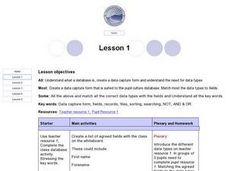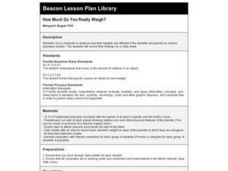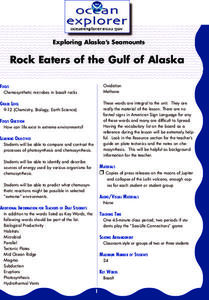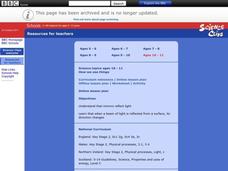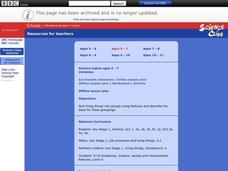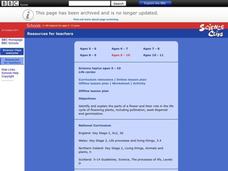Curated OER
Database
Second graders collect daily weather information and introduce them to databases.
Curated OER
Space Travel Brochure
Young scholars discover information about the planets and the solar system. They work together to research a specific planet. They develop a brochure for the planet and share with the class.
Curated OER
Finding Out About the Stars and Planets
Young scholars complete a web-based activity to study the planets and solar system. Students complete a number of activities including a slide show that depict the true facts about planets.
Curated OER
Human Needs
Students investigate human needs and how they have adapted to different environments. They complete an experiment to discover the effect of stress on muscles. They use the food pyramid to create a plan for healthy eating.
Curated OER
Inner Planets
Students research characteristics of the planets and record their findings on Planet Web worksheet. They create fold paper to create a foldable booklet to display the information they discover about the planets.
Curated OER
Space - In Your Face or Not?
Second graders, in groups, examine how it doesn't matter if they can see the planets in the solar system or not--they're there.
Curated OER
Watershed Management
Learners investigate the concept of a watershed. They conduct research into the concept using a variety of resources. Students take a field trip to a local watershed to make observations. The outcome is a report concerning the outside...
Curated OER
How Much Do You Really Weigh?
Sixth graders check to see how their weights differ if they weighed themselves on different planets. They record their findings on a data sheet.
Curated OER
Rock Eaters of the Gulf of Alaska
Learners compare and contrast the processes of photosynthesis and chemosynthesis. They identify and describe sources of energy used by various organisms for chemosynthesis.
Curated OER
Ourselves
Students use a website to name and compare external body parts of humans and other animals.
Curated OER
Sound and Hearing - Internet Research
Pupils use a website to help them recognize that sound is generated in a variety of ways and from different sources. They determine that sounds vary in tone and loudness, and learn there are different ways to describe sound.
Curated OER
Moving and Growing
Students know that humans and some other animals have bony skeletons inside their body. They know that other animals have skeletons on the outside of their bodies. They explain the role of both kinds of skeletons.
Curated OER
Helping Plants Grow Well
Pupils explain the effect of water, temperature and light on plant growth.
Curated OER
Micro-organisms
Students examine how micro-organisms are living organisms that are often too small to be seen. They explain that micro-organisms may be beneficial or harmful.
Curated OER
Forces in Action
Students ask questions that can be investigated scientifically. They determine how to plan a fair test by changing one factor while keeping other factors the same, to use measurements to draw conclusions and use scientific knowledge to...
Curated OER
How We See Things
Young scholars explain that mirrors reflect light. They examine how when a beam of light is reflected from a surface, its direction changes.
Curated OER
Variation
Students practice sorting living things into groups using their characteristics. Using pictures of leaves and animals, they sort them based on their color and shape and write the objects characteristics under the picture. They share...
Curated OER
Grouping and Changing Materials
Students feel and observe different types of materials. Using the internet, they sort objects based on the materials they are made from and justify their reasons for putting it in a certain category. They identify objects that could...
Curated OER
Using electricity
Students explore how a switch can be used to break a circut. Students construct a simple series circuit and use it for a purpose. Students read the "The Lighthouse Keeper's Lunch,or one of the "Katie Morag" stories which clearly shows...
Curated OER
Helping plants grow well
Students explore the effect of water, temperature and light on plant growth. Students are asked if they remember the LAW for plants. This is Light, Air(temperature) and Water, which all plants need for growth. Students are divided...
Curated OER
Life cycles
Students identify and explain the parts of a flower and their role in the life cycle of flowering plants, including pollination, seed dispersal, and germination. Students recap the following information: that plants need light, warmth,...
Curated OER
Changing Sounds
Students identify how the pitch of an instrument can be altered. They complete a worksheet by labeling several images in order of pitch and then fill a bottle with water to create a sound that matches a pitch on a drawn card.
Curated OER
Gases Around Us
Students participate in a whole class discussion about solids, liquids, and gases. Students get involved in a teacher-directed experiment related to solids, liquids, and gases. Students complete worksheet, writing the names of the parts...
Curated OER
Changing State
Students identify the changing states of water, water vapor and ice in the water cycle They investigate how each of these stages can be reversible. Students complete a worksheet describing the water cycle.


